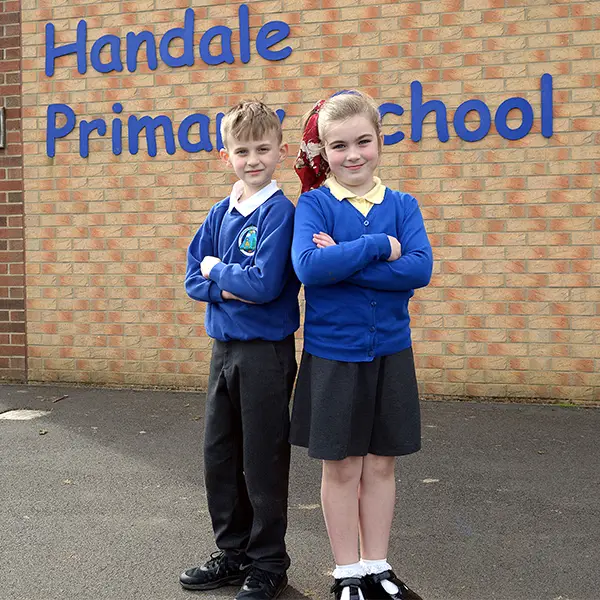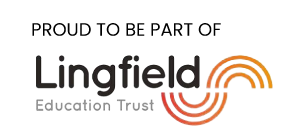
Subject Intent
- To stimulate children’s curiosity about the past.
- For children to develop a sense of identity based on their historical heritage.
- To enable children to know about significant events in British history and understand how things have changed over time.
- To study European history and understand that Britain is part of a wider European history.
- To have an understanding of the history of the wider world.
- To develop a sense and understanding of chronology.
- By the end of their time at Handale, children will have an appreciation of the complexity of people’s lives, the process of change, the diversity of societies and relationships between different groups, as well as their own identity and the challenges of their time.
Key Timeline of Periods Studied

Teaching and Learning
The principle aim of all teaching of history at Handale is to develop the children’s knowledge, understanding and skills in history, as set out in the National Curriculum. We aim to ignite children’s curiosity about the past through the use of high-quality teaching, resources, artefacts and experiences. Historical enquiry is embedded in our history curriculum, where children are given opportunities to develop their ability to think critically and ask questions. Children should be given a ‘hands-on experience’ of history.
This should be done through the following methods:
- Experience of a range of artefacts inc ‘replica’
- Experiencing a range of secondary sources
- Listening to sound clips and videos from the past
- Visiting museums/ historical sites
- Using role play to find out about the past from research gathered.
- Being provided with a range of information from non-fiction books and the internet
- Providing opportunities to work both independently and collaboratively to ask and answer their own historical questions and justify their reasons.
We recognise that each child is unique and that each class is made up of a range of abilities, and so, teaching should be tailored to provide suitable challenge for all learners, ensuring that all children have the same opportunities to access tasks and are challenged appropriately. In history, this should be achieved through adaptive teaching and learning. Teaching history should enable all learners to be inquisitive of the past. At Handale we do this by teaching Substantive (the facts) and Disciplinary knowledge (how historians construct knowledge about the past); teaching children ‘HOW’ historians investigate the past and how the subject ‘works’ enables children to build schemas. All learning is in line with the National Curriculum expectations for each key stage. Each year children will be given a sequential and progressive curriculum so that all children should know more and do more.
At the end of a half term children will be asked an overarching enquiry question found on the MTP. Children will be able to use the skills and knowledge gathered from the previous lesson focuses to be able to answer the question.
There are seven core concepts that run through the curriculum: By using these threads children will make connections, so they can deepen their understanding of the historical second order concepts such as continuity and change, cause and consequence, similarity, difference, and significance.

We follow the National Curriculum Objectives for History at Handale…
Key Stage One
By the end of Key Stage 1, children will have opportunities to:
Develop an awareness of the past, using common words and phrases relating to the passing of time. They should know where the people and events they study fit within a chronological framework and identify similarities and differences between ways of life in different periods. They should use a wide vocabulary of everyday historical terms and historical concepts. They should ask and answer questions, choosing and using parts of stories and other sources to show that they know and understand key events. They should understand some of the ways in which we find out about the past and identify different ways in which it is represented. Planning in Key Stage 1 will introduce children to historical periods focusing in on people, events, and changes. Teachers often introduce children to historical periods which they will study more fully in KS2 and 3.
Key stage 1 – in a nutshell
• Changes within living memory
• Significant events beyond living memory and the lives of significant individuals
• Significant events, people, or places in their locality
Key Stage Two
By the end of Key Stage 2, pupils will have opportunities to:
Pupils should continue to develop a chronologically secure knowledge and understanding of British, local and world history, establishing clear narratives within and across the periods they study. They should note connections, contrasts and trends over time and develop the appropriate use of historical terms and historical concepts. They should regularly address and sometimes devise historically valid questions about change, cause, similarity and difference, and significance. They should construct informed responses that involve thoughtful selection and organisation of relevant historical information. They should understand how our knowledge of the past is constructed from a range of sources. In planning to ensure the progression described above through teaching the British, local and world history outlined below, teachers should combine overview and depth studies to help pupils understand both the long arc of development and the complexity of specific aspects of the content.
Key stage 2 – in a nutshell
• Changes in Britain from the Stone Age to Iron Age
• The Roman Empire and its impact on Britain
• Britain’s settlement by Anglo-Saxons and Scots
• Viking and Anglo-Saxon struggle for control of England
• A local history study
• An aspect or theme extending beyond 1066
• An overview of the earliest civilisations and a depth study of at least one early civilisation
• Ancient Greece
• A non-European society
History Long Term Plan
At Handale Primary School, history is taught through a subject based approach. The National Curriculum for history has been used in order to create long term plans for history across the school.
History is taught every term in a half term block in every year group.

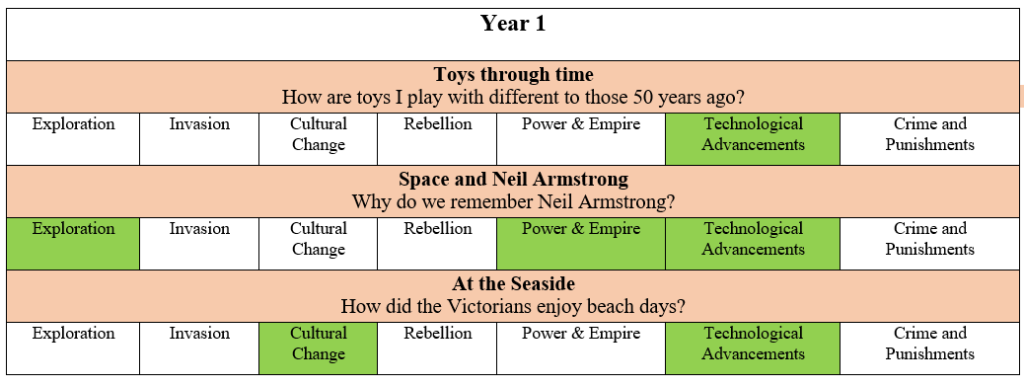
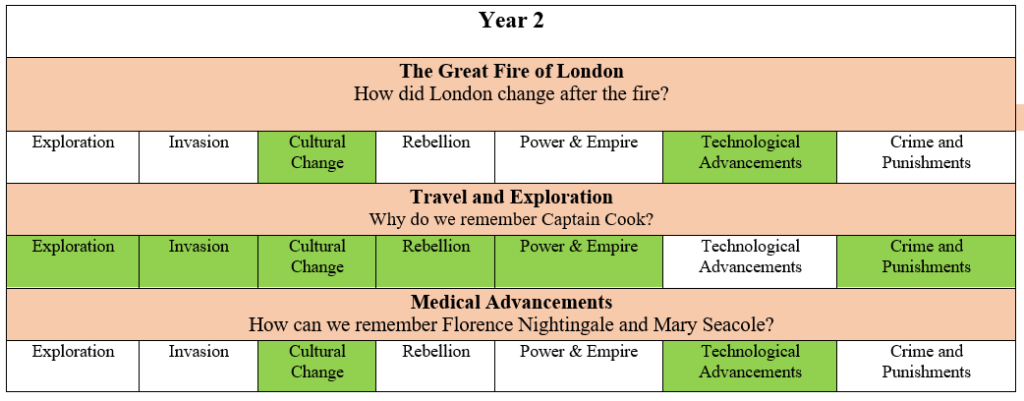
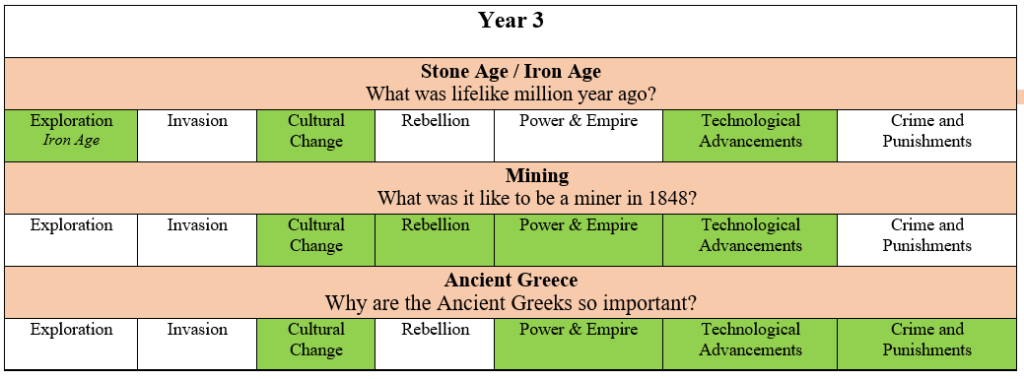

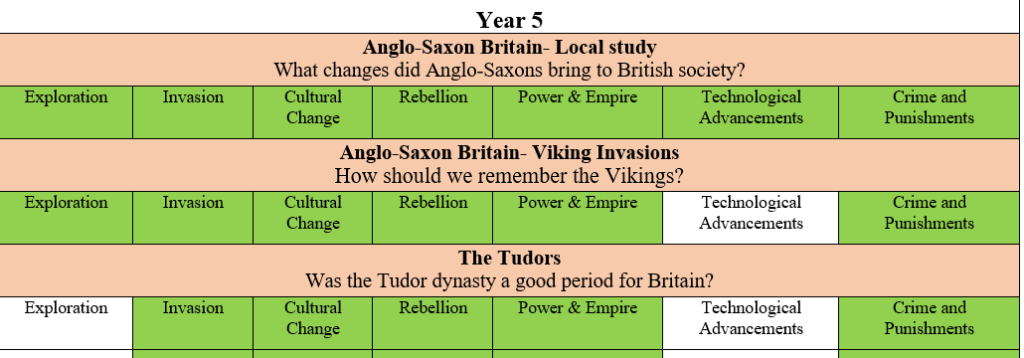
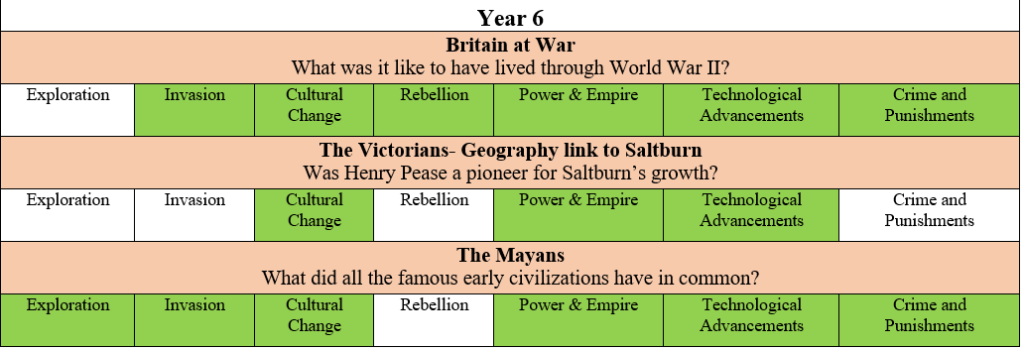
Early Years Foundation Stage
History is taught in Early Years as an integral part of the topic work through child-initiated and adult led activities. The focus for Early Years is to help children understand about their own lives and their families. The children are given the opportunity to find out about past and present events through learning experiences and discussions around their own lives, and those of their families and other people they know. In the Foundation stage, history makes a significant contribution to developing a child’s knowledge and understanding of the world through activities such as dressing up in historical costumes, looking at pictures of famous people in history or discovering the meaning of new and old in relation to their own lives.
A Curriculum for All
SEND Provision
At Handale, children should follow the same ambitious curriculum – as it has been designed with SEND needs in mind. Teachers will identify children who need extra support to achieve lesson outcomes this may done through adapting learning by
• scaffolding and supported to achieve the set end goals.
• If recording is a barrier, children can talk and discuss the content taught or use of a computer.
Teachers will use the schools document ‘Curriculum for All’ to ensure all children can make progress in line with age related expectations.
Children who have an EHCP will be identified and their plans will be followed by teachers to support the children to be successful and enable children to develop their skills to meet national curriculum objectives.
Gifted and Talented Children
Children working above their age related expectations:
- Teachers will provide teaching and learning experiences that encourage pupils to think creatively, explore and develop ideas, and try different approaches. Pupils should be encouraged to set their own questions, offer ideas, suggest solutions or explanations, and reflect on what they have heard, seen or done in order to clarify their thoughts.
- Greater independence in working, e.g. a pupil to be able to carry out their own simple historical enquiry.
- Avoid giving gifted pupils additional writing tasks and encourage them instead to communicate their understanding in a variety of ways, giving them responsibility for choosing and evaluating the most appropriate method.

